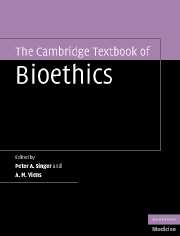Book contents
- Frontmatter
- Contents
- List of contributors
- Acknowledgements
- 1 Introduction
- Section I Information problems
- Section II End of life care
- Section III Pregnant women and children
- Section IV Genetics and biotechnology
- Section V Research ethics
- Introduction
- 25 Research ethics
- 26 Innovation in medical care: examples from surgery
- 27 Clinical trials
- 28 Epidemiological research
- 29 Clinical research and the physician–patient relationship: the dual roles of physician and researcher
- 30 Financial conflict of interest in medical research
- 31 Embryo and fetal research
- Section VI Health systems and institutions
- Section VII Using clinical ethics to make an impact in healthcare
- Section VIII Global health ethics
- Section IX Religious and cultural perspectives in bioethics
- Section X Specialty bioethics
- Index
Introduction
Published online by Cambridge University Press: 30 October 2009
- Frontmatter
- Contents
- List of contributors
- Acknowledgements
- 1 Introduction
- Section I Information problems
- Section II End of life care
- Section III Pregnant women and children
- Section IV Genetics and biotechnology
- Section V Research ethics
- Introduction
- 25 Research ethics
- 26 Innovation in medical care: examples from surgery
- 27 Clinical trials
- 28 Epidemiological research
- 29 Clinical research and the physician–patient relationship: the dual roles of physician and researcher
- 30 Financial conflict of interest in medical research
- 31 Embryo and fetal research
- Section VI Health systems and institutions
- Section VII Using clinical ethics to make an impact in healthcare
- Section VIII Global health ethics
- Section IX Religious and cultural perspectives in bioethics
- Section X Specialty bioethics
- Index
Summary
The efficacy of modern medicine depends very largely on scientific research into the causes of disease, innovative therapies, and methods of organizing and delivering healthcare services. Interestingly, modern bioethics can also be considered to have developed from the articulation of standards for the ethical conduct of medical research. Discussion of the ethics of research in the aftermath of the violations of human life and dignity not only in the Third Reich and Imperial Japan but also in the Western liberal democracies before and after the World War II provoked more general discussions of the ethical basis of medical care. For instance, modern discussions of the role of patient autonomy in bioethics owe much to the analysis of this concept in the Belmont Report of 1979 (p. 195), which was concerned with the protection of human subjects of research.
Until relatively recently, medical research was considered to be an area of special ethical risk, involving, as it often did, exposing patients to risks of harm that could be serious, and that could involve doctors in treating their people more as “research subjects” than as patients who should under no circumstances be harmed. This way of thinking about research ethics remains important. However, more recent thinking about research ethics has pointed out that patients can be harmed by exposing them to untested or unevaluated medical interventions, and that there is far more continuity between research ethics and “ordinary” bioethics than had been thought.
- Type
- Chapter
- Information
- The Cambridge Textbook of Bioethics , pp. 185 - 186Publisher: Cambridge University PressPrint publication year: 2008



